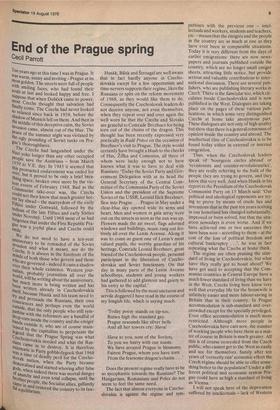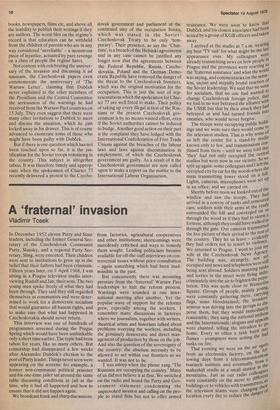End of the Prague spring
Cecil Parrott len years ago at this time I was in Prague. it was warm , sunny and inviting — Prague at its most gulden. The streets were full of people with smiling faces, who had found their souls at last and looked happy and free. I suppose that when Dub'eek came to power, Most Czechs thought that salvation had finally come. The Czechs had never looked S o relaxed since back in 1938, before the Shadow of Munich fell on them. And then in the Middle of this deceptive calm, the Soviet invasion came, almost out of the blue. The Peace of the summer night was violated by the Ugly pounding of Soviet tanks on Prague's thoroughfares. The Czechs had languished under the 'Nazi yoke longer than any other occupied People save the Austrians — from March 1939 to V.E. day. In 1945 it seemed that this protracted enslavement was ended for ever, but it proved to be only a brief breathing space, broken once more by the violent events of February 1948. Bad as the Communist take-over was, the Czechs could not then know that much greater horror lay ahead — the martyrdom of the early Pifties under Gottwald, followed by the tedium of the late Fifties and early Sixties under Novotny. Until 1968 most of us had forgotten that under the First Republic Pra
gne was a joyful place and Czechs could sinile,
We do not need to have a ten-year a. nnwersary to be reminded of the Soviet Invasion and what it meant, nor do the Czechs It is always in the forefront of the minds of both those who govern and those Who are governed — indeed it casts a shadow over their whole existence. Western journalists, probably journalists all over the s,vorld, will be writing about the anniversary, kput much more is being written and has !Jeer" written already in Czechoslovakia itself, because Husak and his team need to irY and persuade the Russians, their own consciences and perhaps even the world outside, that the only people who still sym1:iathise with the reformers are a handful of j°P-outs inside the country and the emigre 1a:rids outside it, who are of course maintamed by the capitalists to perpetuate the l_egend that the Prague Spring was what i-:.zechoslovakia needed and what the Russians came in to destroy. It is therefore axiomatic in Party gobbledygook that 1968 was a time of deadly peril for the Czechosjnvak nation, when the Party became
demoralised and started whoring after false gods,
when indeed there was mortal danger Of anarchy and even total collapse, until the
enrother people, the Socialist allies, gallantly i a_riie n and restored the country to its lawall equilibrium. Husak, Bilak and trougal are well aware that in fact hardly anyone in Czecho slovakia except for a few opportunists and time-servers supports their regime, likes the Russians or spits on the reform movement
of 1968, as they would like them to do. Consequently the Czechoslovak leaders do not deceive anyone, not even themselves, when they repeat over and over again the well worn lie that the Czechs and Slovaks are grateful to Comrade Brezhnev for being torn out of the chains of the dragon. This thought has been recently expressed very poetically in Rude Prtivo on the occasion of Brezhnev's visit to Prague. The style would certainly have brought a blush to the cheeks of Hus, Zaka and Comenius, all three of whom were lucky enough not to have known what it was to have to deal with Russians: 'Today the Soviet Party and Government Delegation with at its head the General Secretary of the Central Committee of the Communist Party of the Soviet Union and the president of the Supreme Soviet of the USSR, Leonid Ilich Brezhnev, flew into Prague.. . Prague in May under a clear-blue sky opened wide its arms and heart. Men and women in gala array were out on the streets as soon as the sun was up. Flowers made the air sweet, flags adorned windows and buildings, music rang out festively all over the Lenin Avenue. Along it was to come as guest one of Lenin's most valued pupils, the worthy guardian of his heritage, Comrade Leonid Brezhnev, great friend of the Czechoslovak people, personal participant in the liberation of Czechoslovakia and Soviet functionary. On that day in many parts of the Lenin Avenue schoolboys, students and young workers had gathered to add glamour and gaiety to his entry to the capital.'
This is followed by the most unctuous and servile doggerel! have read in the course of my longish life, which is saying much.
'Today poesy stands on tip-toe, Raises high the standard gay. Prague resounds like silver bells And all her towers cry: Slava!
Slava to you, sons of the Soviets, To you we hurry with our toasts. We have arrayed Prague in blossoms, Fairest Prague, whom you have torn From the fearsome dragon's chains.. .
Does the present regime really have to be so sycophantic towards the Russians? The Hungarians, Romanians and Poles do not seem to feel the same need.
The fact that almost everyone in Czechoslovakia is against the regime and syrn pathises with the previous one — intellectuals and workers, students and teachers, etc. —means that the émigrés and the people in the country are as much at one as they have ever been in comparable situations. Today it is very different from the days of earlier emigrations: there are now newspapers and journals published outside the country, which are no longer small emigre sheets, attracting little notice, but provide serious and valuable contributions to international discussion. There are several publishers, who are publishing literary works in Czech. There is the Samizdat too, which circulates inside Czechoslovakia and is now published in the West. Dialogues are taking place on the pages of these various publications, in which some very distinguished Czechs at home take anonymous part. These dialogues are not only of high quality but show that there is a general consensus of opinion inside the country and abroad. The intellectual elite of Czechoslovakia is to be found today either in external or internal emigration.
Thus, when the Czechoslovak leaders speak of 'bourgeois circles abroad' or 'revisionists and counter-revolutionaries', they are really referring to the bulk of the people they are trying to govern, and they know this very well. And when Husaik in his report to the Presidium of the Czechoslovak Communist Party on 15 March said: 'Our political and ideological opponents are trying to prove by means of crude lies and inventions that in the past ten years nothing in our homeland has changed substantially, improved or been solved, but that the situation nowadays is even worse. And if we have achieved one or two successes they have been won — according to them — at the cost of the loss of political freedom and cultural bankruptcy . . he was in fact repeating what the Czechs at home think.
The regime are often praising the standard of living in Czechoslovakia, but what have they really got to boast about? We have got used to accepting that the Communist countries in Central Europe have a much lower standard of living than we have in the West. Czechs living here know very well that everyday life for the housewife is infinitely easier and more labour-saving in Britain that in their country. In Prague accommodation is sub-standard and overcrowded except for the specially privileged.
Even office accommodation is much more restricted. Although more people in Czechoslovakia have cars now, the number of working people who have them as a matter of course in Britain is much greater. All this is of course coocealed from the Czech public, who cannot get to the West so easily and see for themselves. Surely after ten years of 'correctly run' economic effort the Czech regime should be able to offer some
thing better to the population? Under a different political and economic system Prague could have as high a standard of living as Vienna.
I will not speak here of the deprivation suffered by intellectuals — lack of Western books, newspapers, films etc, and above all the inability to publish their writings if they are authors. The worst blot on the regime's record is that education can be withheld from the children of parents who are in any way considered 'unreliable' — a monstrous piece of injustice, actuated by pure revenge on a class of people the regime hates.
Not content with celebrating the anniversary of the invasion and discussing it ad nauseam, the Czechoslovak papers even commemorate the anniversary of 'The Warsaw Letter', claiming that Dubeek never explained to the other members of the Presidium and the Central Committee the seriousness of the warnings he had received from the Warsaw Pact countries on 15 July. They even suggest that there were many other invitations to Dubeek to meet and discuss the situation, which he just locked away in his drawer. This is of course advanced to exonerate some of those who might have been guilty with Dubeek.
But if there is one question which has not been touched upon so far, it is the justification for the Soviet troops remaining in the country. This subject is altogether taboo. It was therefore timely and appropriate when the spokesmen of Charter 77 recently delivered a protest to the Czecho slovak government and parliament at the continued stay of the occupation forces, which was stated in the SovietCzechoslovak Treaty to be only 'temporary'. Their presence, so say the 'Chartists', is a breach of the Helsinki agreements and in any case cannot be justified any longer now that the agreements between the Federal Republic, Russia, Czechoslovakia, Poland and the German Democratic Republic have removed the danger of the threat to the Czechoslovak frontiers, which was the original motivation for the occupation. This is just the sort of representations which the spokesmen for Charter 77 are well fitted to make. Their policy of taking up every illegal action of the Russians or the present Czechoslovak government is by no means wasted effort, even if the Soviet authorities cannot be induced to budge. Another good action on their part is the complaint they have lodged with the International Confederation of Free Trade Unions against the breaches of the labour laws and laws against discrimination in employment, of which the Czechoslovak government are guilty. As a result of it the Czechoslovak government are now called upon to make a report on the matter to the International Labour Organisation.



































 Previous page
Previous page